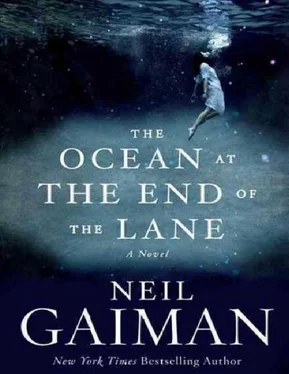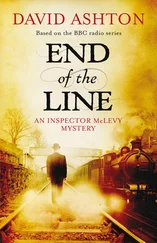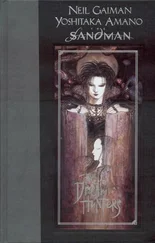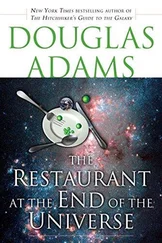Old Mrs. Hempstock passed me a mug, filled with soup from the black pot on the stove. “Get that down you. Heat you up from the inside, first.”
The soup was rich, and warming. I had never drunk soup in the bath before. It was a perfectly new experience. When I finished the mug I gave it back to her, and in return she passed me a large cake of white soap and a face-flannel and said, “Now get scrubbin’. Rub the life and the warmth back into your bones.”
She sat down in a rocking chair on the other side of the fire, and rocked gently, not looking at me.
I felt safe. It was as if the essence of grandmotherliness had been condensed into that one place, that one time. I was not at all afraid of Ursula Monkton, whatever she was, not then. Not there.
Young Mrs. Hempstock opened an oven door and took out a pie, its shiny crust brown and glistening, and put it on the window ledge to cool.
I dried myself off with a towel they brought me, the fire’s heat drying me as much as the towel did, then Lettie Hempstock returned and gave me a voluminous white thing, like a girl’s nightdress but made of white cotton, with long arms, and a skirt that draped to the floor, and a white cap. I hesitated to put it on until I realized what it was: a nightgown. I had seen pictures of them in books. Wee Willie Winkie ran through the town wearing one in every book of nursery rhymes I had ever owned.
I slipped into it. The nightcap was too big for me, and fell down over my face, and Lettie took it away once more.
Dinner was wonderful. There was a joint of beef, with roast potatoes, golden-crisp on the outside and soft and white inside, buttered greens I did not recognize, although I think now that they might have been nettles, roasted carrots all blackened and sweet (I did not think that I liked cooked carrots, so I nearly did not eat one, but I was brave, and I tried it, and I liked it, and was disappointed in boiled carrots for the rest of my childhood). For dessert there was the pie, stuffed with apples and with swollen raisins and crushed nuts, all topped with a thick yellow custard, creamier and richer than anything I had ever tasted at school or at home.
The kitten slept on a cushion beside the fire, until the end of the meal, when it joined a fog-colored house cat four times its size in a meal of scraps of meat.
While we ate, nothing was said about what had happened to me, or why I was there. The Hempstock ladies talked about the farm—there was the door to the milking shed needed a new coat of paint, a cow named Rhiannon who looked to be getting lame in her left hind leg, the path to be cleared on the way that led down to the reservoir.
“Is it just the three of you?” I asked. “Aren’t there any men?”
“Men!” hooted Old Mrs. Hempstock. “I dunno whatblessed good a man would be! Nothing a man could do around this farm that I can’t do twice as fast and five times as well.”
Lettie said, “We’ve had men here, sometimes. They come and they go. Right now, it’s just us.”
Her mother nodded. “They went off to seek their fate and fortune, mostly, the male Hempstocks. There’s never any keeping them here when the call comes. They get a distant look in their eyes and then we’ve lost them, good and proper. Next chance they gets they’re off to towns and even cities, and nothing but an occasional postcard to even show they were here at all.”
Old Mrs. Hempstock said, “His parents are coming!They’re driving here. They just passed Parson’s elm tree. The badgers saw them.”
“Is she with them?” I asked. “Ursula Monkton?”
“Her? ” said Old Mrs. Hempstock, amused. “That thing? Not her.”
I thought about it for a moment. “They will make me go back with them, and then she’ll lock me in the attic and let my daddy kill me when she gets bored. She said so.”
“She may have told you that, ducks,” said Lettie’s mother, “but she en’t going to do it, or anything like it, or my name’s not Ginnie Hempstock.”
I liked the name Ginnie, but I did not believe her, and I was not reassured. Soon the door to the kitchen would open, and my father would shout at me, or he would wait until we got into the car, and he would shout at me then, and they would take me back up the lane to my house, and I would be lost.
“Let’s see,” said Ginnie Hempstock. “We could be away when they get here. They could arrive last Tuesday, when there’s nobody home.”
“Out of the question,” said the old woman. “Just complicates things, playing with time . . . We could turn the boy into something else, so they’d never find him, look how hard they might.”
I blinked. Was that even possible? I wanted to be turned into something. The kitten had finished its portion of meat-scraps (indeed, it seemed to have eaten more than the house cat) and now it leapt into my lap, and began to wash itself.
Ginnie Hempstock got up and went out of the room. I wondered where she was going.
“We can’t turn him into anything,” said Lettie, clearing the table of the last of the plates and cutlery. “His parents will get frantic. And if they are being controlled by the flea, she’ll just feed the franticness. Next thing you know, we’ll have the police dragging the reservoir, looking for him. Or worse. The ocean.”
The kitten lay down on my lap and curled up, wrapping around itself until it was nothing more than a flattened circlet of fluffy black fur. It closed its vivid blue eyes, the color of an ocean, and it slept, and it purred.
“Well?” said Old Mrs. Hempstock. “What do you suggest, then?”
Lettie thought, pushing her lips together, moving them over to one side. Her head tipped, and I thought she was running through alternatives. Then her face brightened. “Snip and cut?” she said.
Old Mrs. Hempstock sniffed. “You’re a good girl,” she said. “I’m not saying you’re not. But snippage . . . well ,you couldn’t do that. Not yet. You’d have to cut the edges out exactly, sew them back without the seam showing. And what would you cut out? The flea won’t let you snip her. She’s not in the fabric. She’s outside of it.”
Ginnie Hempstock returned. She was carrying my old dressing gown. “I put it through the mangle,” she said. “But it’s still damp. That’ll make the edges harder to line up. You don’t want to do needlework when it’s still damp.”
She put the dressing gown down on the table, in front of Old Mrs. Hempstock. Then she pulled ou from the front pocket of her apron a pair of scissors, black and old, a long needle, and a spool of red thread.
“Rowanberry and red thread, stop a witch in her speed, ” I recited. It was something I had read in a book.
“That’d work, and work well,” said Lettie, “if there was any witches involved in all this. But there’s not.”
Old Mrs. Hempstock was examining my dressing gown. It was brown and faded, with a sort of a sepia tartan across it. It had been a present from my father’s parents, my grandparents, several birthdays ago, when it had been comically big on me. “Probably . . . ,” she said, as if she was talking to herself, “it would be best if your father was happy for you to stay the night here. But for that to happen they couldn’t be angry with you, or even worried . . .”
The black scissors were in her hand and already snip-snip-snipping then, when I heard a knock on the front door, and Ginnie Hempstock got up to answer it. She went into the hall and closed the door behind her.
“Don’t let them take me,” I said to Lettie.
“Hush,” she said. “I’m working here, while Grandmother’s snipping. You just be sleepy, and at peace. Happy.”
I was far from happy, and not in the slightest bit sleepy. Lettie leaned across the table, and she took my hand. “Don’t worry,” she said.
Читать дальше












